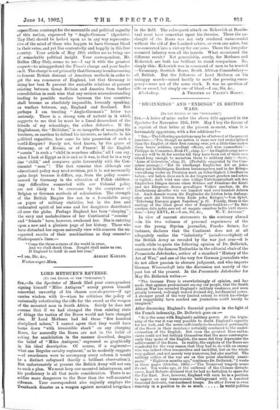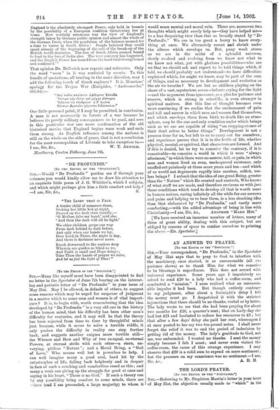" BEGINNINGS " AND "ENDINGS" IN BRITISH WARS.
[TO THE EDITOR OF TI1R "SPECTATOR.")
Sta,—A letter of mine under the above title appeared in the Spectator for November 11th, 1899. May I beg the favour of a reprint of that letter at the present moment, when it is fortunately opportune, with a few additions P- " Sin,—The following quotations may be of interest at the present juncture For, though no nation is more raw and undisciplined than the English at their first coming over, yet a little time makes them brave soldiers, excellent officers, and wise counsellors.' — Philippe do Commines, Book IV., chap. 5.—` An English army never was nor will be fit for service till they have been out of their own island long enough to accustom them to military duty.'—Scott, 'Anne of Geierstein: chap. 25. (Probably suggested by the Coin- mines passage.)—` Est ist aberhaupt Englischer Art an jedeu Krieg mit bedachtigem Zaudern heranzugehen und in der Kriegs- verwaltung weder an Prazision noch an Schnelligkeit liberfluss zu haben—wir haben diess auch in der Gegenvnut gesehen und seheu es taglich ; doch wird nur eine vollige Unbekanntschaft mit den Englischen Dingen daraus einen Schluss auf Abnahme der Kraft and des Ehrgeizes theses gewaltiges Volkes machen, da die Erscheinung dieselbe wie vor hundert mid zwei hundert Jahren ist. Auch damals Is-aren die Englander die letzten beim Anfange aber auch die letzten beim Ende jedes Krieges.'—Von Sybel, Erhebung Europas gegen Napoleon: p. 37. Finally, there is the analogy of the other great race of Empire-builders:—' Ea fate quodam data nobis son eat ut ntagnis omnibus bellis victi viceri- mus:—Livy XXVI., 41.—I am, Sir, W. T. ARNOLD."
In view of current statements to the contrary abroad —in his two volumes of personal experiences of the war the young Styrian journalist, Franko Seiner, for instance, declares that the Continent does not at all adequately realise the " inferiority " (nlinderwerfigkeit) of the British Army as revealed by the war just over—it is worth while to quote the following opinion of Dr. Delbriick, successor to the famous Treitschke in the editorial chair of the Preussische Jahrbicher, author of a standard "History of the Art of War," and one of the very few German journalists who do not allow passion to obscure judgment, and who imports German Wissenschaft into the discussion not merely of the past but of the present. In the Preussische lahrbiicher for
May Dr. Delbriick writes :—
" The German Press is overwhelmingly of opinion, and has made that opinion predominant among our people, that the South African War has revealed England's military weakness, and even greatly lowered, well-nigh indeed drained dry, her financial power. A stronger proof of the very limited extent to which knowledge and impartiality have reached our journalism could hardly be imagined."
After discussing England's financial position in the light of the French indemnity, Dr. Delbriick goes on :—
"It is the same with England's military power. At the begin- ning of the wart was very possible to doubt England's capacity the never-sufficiently-to-be-admired tciently- be-adizured pertmlity ofofrthheerBoe task, in their resis nee naturally conduced to the under- estimation of the English. But even the greatest Boer enthu- siasts could not but bethink themselves that the more contemptu- ously they spoke of the English, the more did they depreciate the achievement of the Boers. In reality, the exploits of the Boers are wonderful for the very reason that they had to do with an enemy who was indeed often resourceless and unskilful, but on the whole very gallant, and not merely very numerous, but also martial. The military critics of the war are on this point absolutely unani- mous." "Eighteen months ago," continues Dr. Delbrack, "I wrote in these pages (October, 1900):—' The Transvaal tragedy nears its end. Ten weeks ago, at the outbreak of the Chinese disturb- ances, Lord Roberts declared that he had no battalion to spare-for the Far East. Now, however, England will soon be in a position to appear on any trans-oceanic battleground with a hundred thousand first-rate, war-hardened troops. No other Power is even remotely in a position to do so much In world-politics
England is the absolutely strongest Power, only held in bounds by the possibility of a European coalition threatening her at home. How woefully erroneous was the view of England's strength taken by German public opinion and almost the whole of the German Press, when the pendulum of the balance seemed for a time to waver in South Africa ! People believed they could speak already of the beginning of the end of the break-up of the British world-dominion. The loss of South Africa seemed bound to lead to the loss of India also. The very contrary has happened, and the English Power has issued from the hard trial strengthened and confirmed."
That opinion Dr. Delbriick now repeats and reiterates. Only the word " soon " in it was confuted by events. To this bundle of quotations, all tending in the same direction, may I add the following touch of Greek sapience ? It is Menelaus' apology for the Trojan War (Euripides, "Andromache," 681-84) :—
"Kul roisorA.E7111-01, 47001110W 'EAAtaa 'On'Avol, "yip 6PTES IMIXM iclo,ropes 'E/3noav *is TavSpeiirv*ij bs' Ilcivrov /3poToiat 717verat dtSciolccaorY One little personal point, if I may be permitted, in conclusion. A man is not necessarily in favour of a war because he believes its purely military consequences to be good, and sees in this particular war one more confirmation of the old historical maxim that England begins wars weak and ends them strong. As English influence among the nations is still on the whole on the side of peace, that is not a conclusion for the most cosmopolitan of Liberals to take exception to.— I am, Sir, eze., W. T. ARNOLD. Mont barry, Canton Fribourg, June 7th.











































 Previous page
Previous page